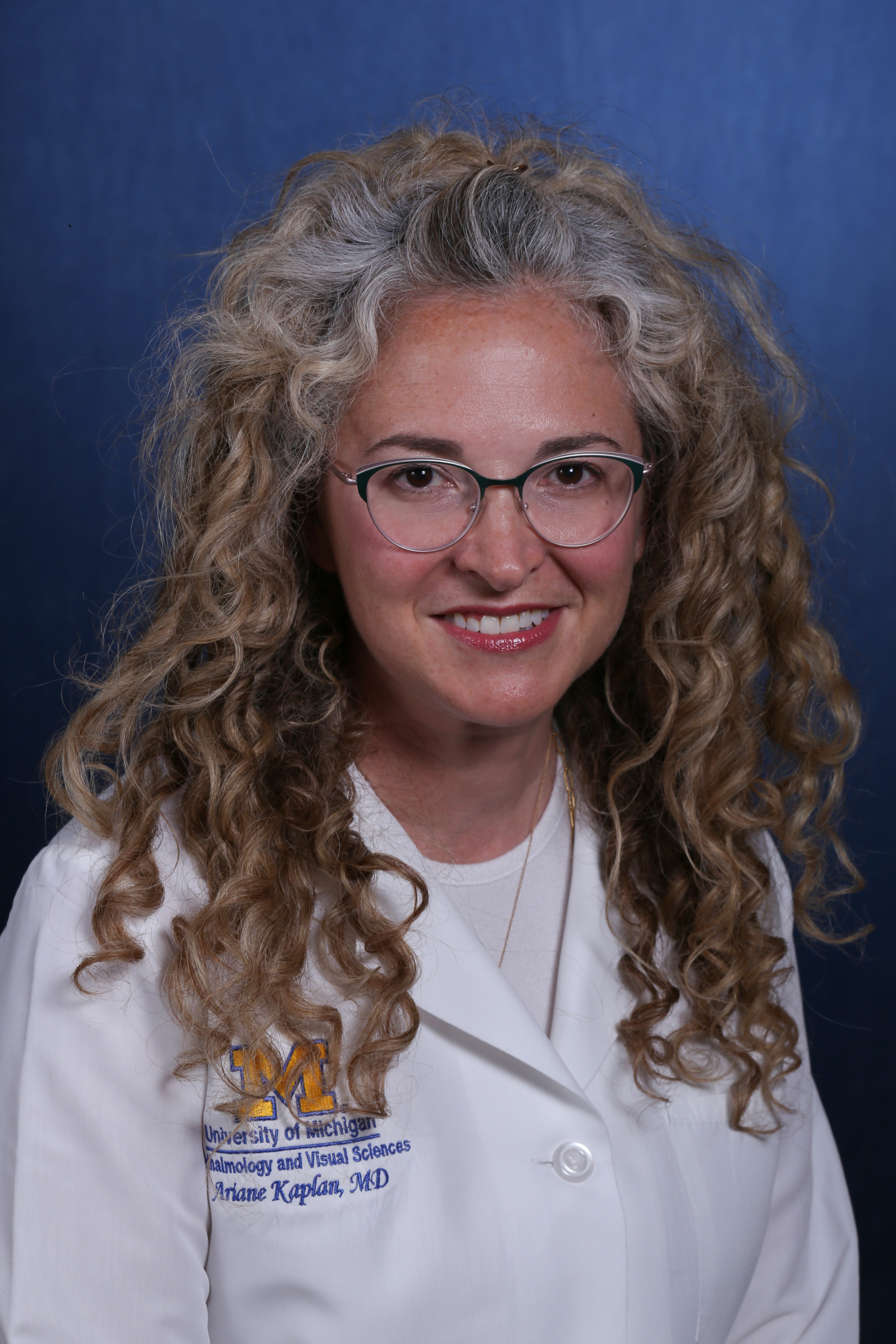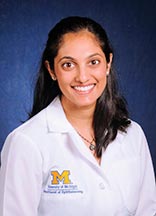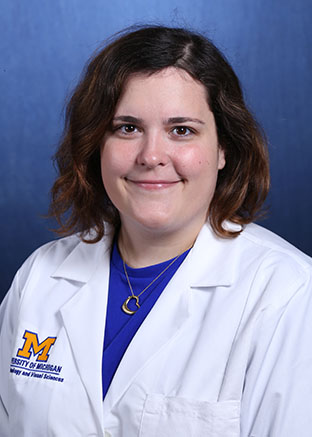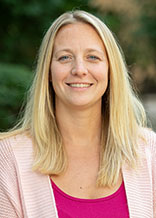A physician specializing in ophthalmology helps provide medical and surgical care to patients. Ophthalmologists work to maintain and preserve vision for patients, as well as ensure patients maintain ocular health and comfort. There are many subspecialties available within ophthalmology including comprehensive, glaucoma, cornea, pediatrics and strabismus, retina, neuro-ophthalmology, oculoplastics, and ocular oncology.
During the 2 and 4-week courses offered, students will be assigned to our clinics and have time to observe in the operating room. Students will be taught clinical exam skills to allow for a more hands-on approach. Didactic sessions incorporating lectures and case-based learning accompany the clinical rotations. Students will also be assigned to our consults team at the Main Hospital which will allow them to see consults through the emergency room and inpatient units.
Please direct any questions to Rachel Riddle, Medical Student Clerkship Coordinator.
Courses Offered
2-week Exploration Electives
The 2-week Exploration Electives are offered and suggested prior to taking the 4-week clinical elective at the beginning of the Branches.
2-week Online Elective
The 2-week Online Elective is intended for those applying into Internal Medicine, Pediatrics, Family Medicine, Emergency Medicine, or Neurology as well as anyone wanting to better learn the fundamentals of Ophthalmology in preparation for residency training. This course is ONLY intended for students who have not and do not plan to take any additional ophthalmology courses.
- OPHTH-8300: Online Ophthy: The Basics ("The Eyes Have It" Online)
4-week Clinical Elective
The 4-week Clinical Elective should be taken after a 2-week exploration elective (if you choose to do so) and before an Advanced Clinical and Research Course. Students spend a week in the Comprehensive Clinic, Consults at the Main Hospital, and two subspecialty clinics (along with OR time).
- Branch students should take the course in March, April, or May, during their “Early” Branch phase.
- OPHTH-8200: Clinical
Ophthy Advanced Clinical & Research Course
The Ophthy Advanced Clinical & Research Course is available for students committed to Ophthalmology that have already taken the traditional 4-week clinical elective. This course includes clinical and research components and students are asked to identify a mentor to work with.
Ophthy Research Electives
The Ophthy Research Electives can be valuable if your time and efforts are productive. Research electives are offered all periods at the Kellogg Eye Center.
Faculty Career Advisors
There is an entire team of ophthalmology faculty dedicated to supporting students through their medical school career, mentoring, and advising through the residency application process. UMMS students can contact Rachel Riddle, Medical Student Clerkship Coordinator, to be paired with a faculty career advisor.
Visiting Student Information
Ophthalmology: OPHTH-8200 – Clinical
This 4-week clinical elective is located at the Kellogg Eye Center during June, July, August, and September, and is open to medical students from other institutions who are in their M3/M4 year of medical school. Application and submission dates can be found on the Visiting Student Learning Opportunities™ (VSLO) Website.
Domestic students
Domestic students can apply through the AAMC – Visiting Student Learning Opportunities™ (VSLO) Website.
- Application requirements: Visiting Student Program Application Requirements (link is external)
- Eligibility: Refer to U.S. Medical School Students section of the Visiting Students(link is external) page on the U-M Medical School website.
- Ophthalmology is participating in the 2023 Michigan Medicine Health Equity Visiting Clerkship, through The Office of Health Equity and Inclusion. Please visit the Health Equity Visiting Clerkship page for eligibility, stipend, and application details.
- Additional information can be found on the Visiting Students(link is external) page on the U-M Medical School website.
International Students
International Students in their final year of medical school are eligible to complete a 4-week clinical rotation in October or November. Please contact Donna Donato, Global Ophthalmology Program Coordinator.
Please contact Rachel Riddle, Medical Student Clerkship Coordinator, with any questions.
Opportunities
This list will be updated as opportunities are available. For additional information, please contact Rachel Riddle, Medical Student Clerkship Coordinator.
Hope Clinic Volunteering
This volunteer experience provides medical students the opportunity to learn hands-on skills in ophthalmology that will allow them to work with Kellogg Eye Center faculty, residents, and staff to provide vital care to the uninsured and underserved in our community through the Hope Clinic.
- Students begin by learning the following skills: completing a history, vision checking, pinhole visual acuity, lensometry and autorefraction, and how to properly document in patient charts.
- Pending skill level/experience, students will then focus on a more advanced skill set: confrontation visual fields, ocular motility, and intraocular pressure.
- Opportunity available to UMMS students and must be trained and assessed prior to volunteering.
All volunteering experiences must be coordinated by Rachel Riddle, Medical Student Clerkship Coordinator.
Health Equity Ophthalmology Summer Program
This program is intended for medical students passionate in the areas of diversity, health equity and creating equal opportunities for patients, faculty and staff, regardless of their race, color, national origin, age, marital status, sex, sexual orientation, gender identity, gender expression, disability, religion, height, weight or veteran status.
Download the 2024 Health Equity Ophthalmology Summer Program information sheet.
- Program Outline: Participants will be exposed to the field of Ophthalmology to:
- Address inequities and disparities in eye care
- Understand benefits of increasing diversity among the Ophthalmology physician workforce
- Become familiar with skills/techniques to provide primary eye care to patients
- Gain mentorship and guidance to be a competitive applicant to Ophthalmology residencies
- Engage and practice how to be a clinical student while strengthening fund of ophthalmology knowledge
- Curriculum includes a research project focused on inequities in eye care, clinical and surgical exposure, and participation in weekly Grand Rounds and department conferences. Participants are expected to present research on a national level (i.e.: NMA, Rabb Venable, ARVO, etc.) & are highly encouraged to submit for publication.
- Who Should Apply:
- M1s, from any U.S. medical school
- Students with a 4-8-week summer break, between M1 and M2 year.
- Time commitment is approximately 40 hours per week and program start/end dates are coordinated around participant’s school schedule.
- Students interested in health equity, specifically within Ophthalmology
- A stipend will be provided
- Applications:
- Applications will be accepted for Summer 2024 beginning on November 7, 2023 at 8:00 am through January 15, 2024 at 5:00 pm.
- Submit your application online
- Application Components:
- One letter of recommendation (written by an ophthalmologist, physician from another specialty, or professor)
- Curriculum vitae
- Personal statement outlining the following (400-word count maximum):
- What motivated you to apply for this opportunity?
- Explain why you are a good candidate for this opportunity. Feel free to draw from life experiences, past research experience, and prior diversity, equity, and inclusion participation.
- State general research interests to allow the review committee to assist in the mentor pairing process.
- Research Presentation Funding Opportunity: Program participants accepted to present original clinical, basic science or educational scholarship at a regional, national, or international meeting will be considered for a Health Equity Ophthalmology Summer Program - Research Presentation Award upon submission of an application for such funding.
Michigan Ophthalmology Pathway program (MOP)
MOP Program was created in 2017 to build a near-peer mentoring program between incoming M1 medical students and ophthalmology residents. Through the years, the program has expanded to include medical students at all stages of their undergraduate medical training who are interested in the field of ophthalmology and seek mentoring. We encourage shadowing in the clinics and operating rooms, research opportunities, and social gatherings to build camaraderie.
We recruit for the M1 class during the Fall of their first year. We have an application process to select students and then match them with ophthalmology residents and faculty to create a family structure. For students who are interested in joining MOP in their M3 year, we recruit in the Fall of the M3 year and match students with faculty dedicated to mentoring them through the residency application process.
Special events for MOP participants include slit lamp skills night, EyeSi Surgical Simulator experience, DEI guest lecturer dinner, and informal dinners with MOP family members (medical students, residents, and faculty).
If you are interested in learning more about the MOP Program, please contact Rachel Riddle, Medical Student Clerkship Coordinator.
Related Publication: Michigan Ophthalmology Pipeline: Exploring a Mentorship Model to Increase Diversity in Ophthalmology
Shadowing Opportunities
- Located at the Kellogg Eye Center, ophthalmologist shadowing opportunities are open to undergraduate, pre-medical & medical students.
- Kellogg Eye Center does not currently have a university-sponsored program in place allowing minors to shadow an ophthalmologist.
- HIPAA, Code of Conduct, Immunization Record, Visiting Observer Request Form must be on file prior to the student shadowing.
All shadowing experiences must be coordinated by Rachel Riddle, Medical Student Clerkship Coordinator.
Research Volunteering
Volunteer research opportunities are available for medical students at the Kellogg Eye Center. To find a research project of interest to you, please review the information in the Research section of this website.
- Students are welcome to email the Principal Investigator (PI) directly regarding research opportunities in their lab.
- When emailing a PI, please include your CV, why you’re interested in their project(s), and any prior experience or skills.
- Students may need to meet with KEC’s Research Compliance Specialist if the project involves human subjects or their data.
- All students may be required to complete the onboarding process through Michigan Medicine Volunteer Services.
Medical students must notify Rachel Riddle, Medical Student Clerkship Coordinator, prior to beginning any research project.





